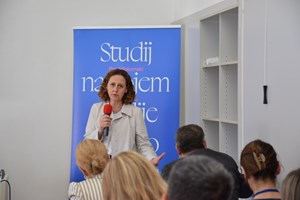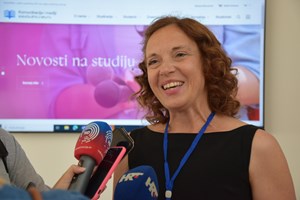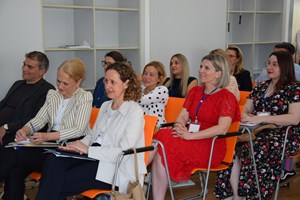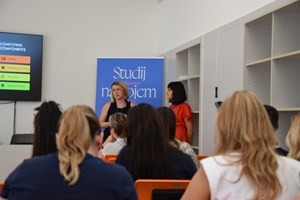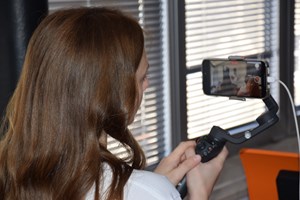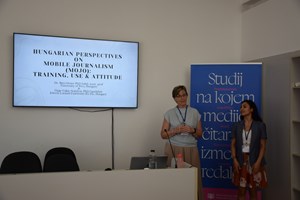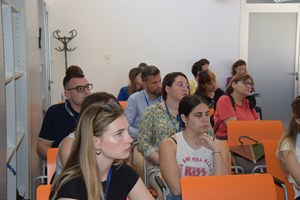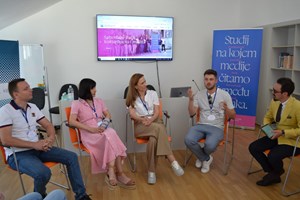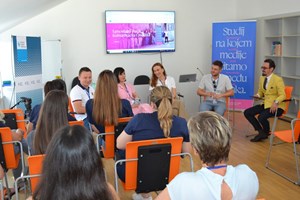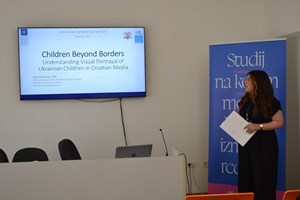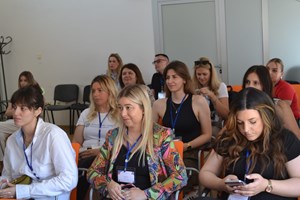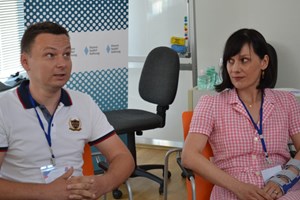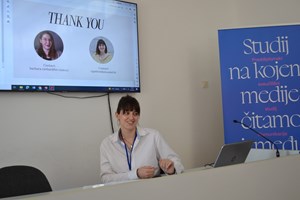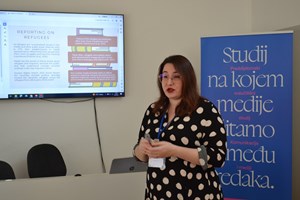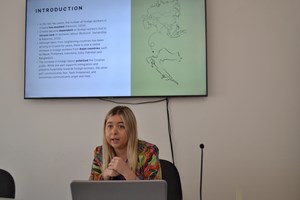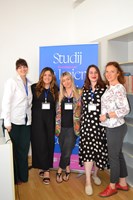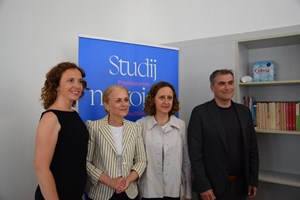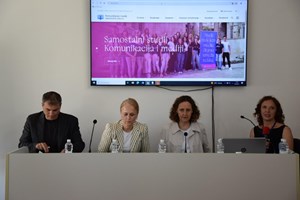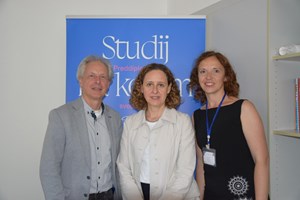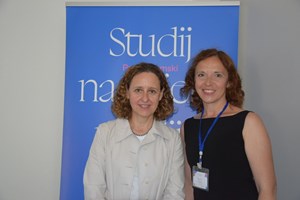Three Days of Dialogue, Knowledge, and Inspiration: Communication & Media Days Split 2025
Conference Program
The conference was officially opened in a bright and inspiring atmosphere, with welcoming words from Prof. Dr. sc. Viktorija Car and a panel discussion on the future of media freedom in Europe. The first day was also marked by an emotional moment for third-year undergraduate students — the opening of the photo exhibition Erasing Masks, which spoke through the lenses of young authors about identity, pressures, and personal expression.
The second day focused on the fight against misinformation. Through a series of presentations and workshops, participants explored ways to defend facts in an era of fake news, deepfakes, and emotional manipulation. Particularly impactful were encouraging examples of cooperation between different generations and media organizations in promoting truth and credible information.
The final day of the conference offered reflections on new technologies, education, and the role of journalism in the digital age. Artificial intelligence, neuromarketing, media literacy, and the quality of information were all topics that sparked fruitful discussions and raised new questions about the future of communication and media.
Once again, the conference confirmed its importance as a space for meeting, knowledge exchange, and inspiration. Thanks to all participants, speakers, and students for their effort, openness, and community spirit. See you next year, even more curious, louder, and more connected!
Below is a selection of photos from the Erasing Masks exhibition: Katalog fotografija
The second day focused on the fight against misinformation. Through a series of presentations and workshops, participants explored ways to defend facts in an era of fake news, deepfakes, and emotional manipulation. Particularly impactful were encouraging examples of cooperation between different generations and media organizations in promoting truth and credible information.
The final day of the conference offered reflections on new technologies, education, and the role of journalism in the digital age. Artificial intelligence, neuromarketing, media literacy, and the quality of information were all topics that sparked fruitful discussions and raised new questions about the future of communication and media.
Once again, the conference confirmed its importance as a space for meeting, knowledge exchange, and inspiration. Thanks to all participants, speakers, and students for their effort, openness, and community spirit. See you next year, even more curious, louder, and more connected!
Below is a selection of photos from the Erasing Masks exhibition: Katalog fotografija
Conference Program
Second Day of the Communication and Media Days Split 2024 Conference Marked by Mobile Journalism
Ivica Grudiček, a journalist from Croatian Radiotelevision (HRT), opened the day with a lecture on one of this year’s key conference topics: Mobile Journalism - New Era of News Reporting.
In the morning session, two panels took place with guests and collaborators from 11 European universities. The first panel, moderated by Gheorghe Anghel from the University of Bucharest, titled Regional Perspectives in Mobile Journalism, featured six presentations:
In the afternoon, a panel on Contemporary Trends in Newsrooms was held, presenting key journalism trends with an emphasis on the role of mobile journalism. Petra Kovačević started with a presentation titled Reporting from a Different Perspective: What is Solutions Journalism? explaining the concept of solutions journalism. Next, Professor Tena Perišin presented Young Audience Wants More: Creating and Testing Innovative Storytelling Techniques, giving insight into the media preferences and desires of the youth. Miroslav Ivić from Slobodna Dalmacija analyzed the development of journalism and changes over time in his presentation How to Use New Formats and Types of Journalism to Come Closer to the Language of the Audience? Mate Prlić from Dalmatinski portal continued the topic with How Have Mobile Phones Changed (Local) Journalism? explaining the current situation on local portals and the pros and cons of mobile journalism. The panel ended with presentations by Vesna Vujević, editor of Radio Kampus, with What Does a Radio Even Look Like? and Silvija Turić from Radio Dalmacija with The Friendship of Radio and Smartphones?, focusing on radio as a medium and explaining the benefits of smartphone use today.
The second day concluded with a roundtable discussion on mobile journalism and industry representatives. Silvija Turić, Laura Visković, Ivica Grudiček, and Dejan Oblak discussed how mobile journalism is changing the profession and the role of today’s audience in shaping media content. Throughout the day, the Mobile Journalism Storytelling Workshop, led by Professor Tena Perišin and Dejan Oblak, was held, where students learned the basics of video journalism, familiarized themselves with MoJo equipment, and filmed MoJo stories in the field.
Marijeta Babik
Final Day of the First Communication and Media Days in Split
Two parallel panels were held on the last day of the conference. The first panel, opened and moderated by Professor Viktorija Car, was dedicated to media representations, titled Media Narratives and Media Frames in Reporting and Representing Refugees and Migrants. Three presentations on the portrayal of Ukrainian refugees in Croatian media followed: Barbara Ravbar from Charles University in Prague presented Victims or Survivors? Representation of the Ukrainian Refugees in the Croatian Online Media, followed by PhD candidate and assistant Vanja Pavlov with Reporting on Ukrainian Refugees in the Croatian Media: Humanity Media Frame. Postdoctoral researcher Leali Osmančević from the Catholic University of Croatia presented Children Beyond Borders: Understanding Visual Portrayal of Ukrainian Children in Croatian Media. The final presentation of this panel was by PhD candidate and assistant Antea Boko from our department, titled Media Portrayal of Foreign Workers in Croatia: Are They Victims, Threats, or a Necessity?
Parallelly, a student panel Media Literacy Projects was held. Moderator Assistant Professor Nebojša Lujanović opened the panel with a short lecture Media vs. Textual Literacy: New Media, New Alphabet, defining key terms and issues. Tonči Gabelić presented research Venus & Eros: Gender Representation in Croatian Music Videos, addressing objectification, sexualization, and the concept of the male gaze in Croatian music. The panel ended with first-year students presenting their projects on media possibilities in activism: Rita Aničić and Marijeta Babik presented New Media Possibilities: Bradata Aukcija as an example of an activist movement originating in our city, while Martina Gugić and Daria Vusić presented The Impact of TikTok on Environmental Activism, focusing on the global ecological activism movement on the fast-growing TikTok platform.
The conference concluded with the presentation of video projects by students participating in the three-day Mobile Journalism Storytelling Workshop, led by Professor Tena Perišin and Dejan Oblak from the Faculty of Political Science, University of Zagreb. Five projects were presented on topics: Communication and Media Studies, Urbanization of Split, Life in Split,
Reportage on Varoš, and Picigin. You can read about the students' three-day experience on our website.
Thanks to everyone who participated in our first Communication and Media Days Split 2024 conference — we hope this is just the first of many!
Marijeta Babik
Mobile Journalism Storytelling Workshop
As part of the Communications & Media Days Split 2024 conference, the Mobile Journalism Storytelling Workshop (MoJo workshop) was held for students under the guidance of Professor Tena Perišin and assistant Dejan Oblak from the Journalism Department at the Faculty of Political Science, University of Zagreb. The workshop took place throughout all three days of the conference, from June 6th to 8th, 2024.
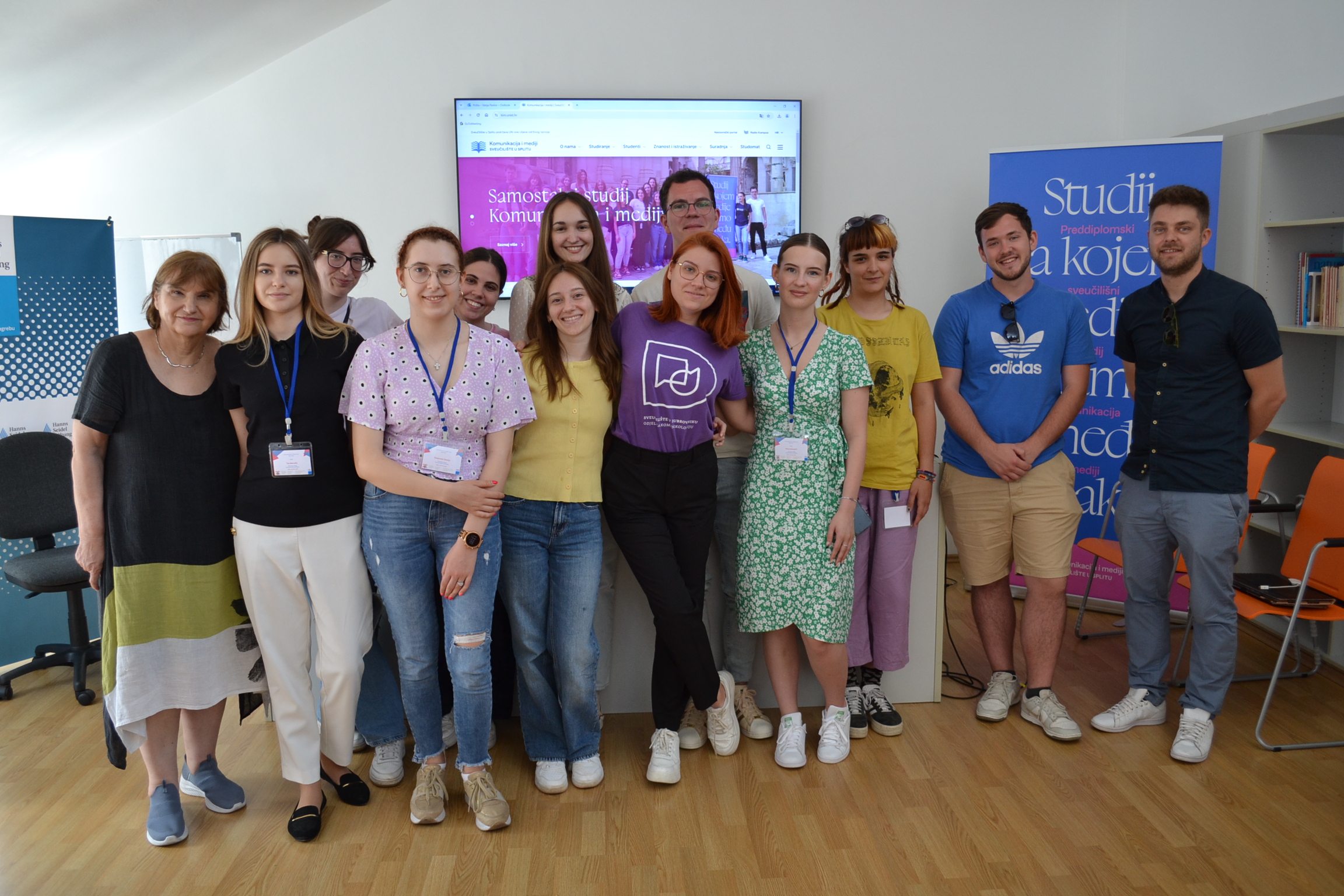 The workshop aimed to prepare students for the challenges of story planning, shooting, and editing on mobile devices, as well as to showcase the possibilities and potential of journalism using only a mobile device as the technological base. Additional mobile equipment was provided to students (such as mobile microphones, tripod stands with control panels, lavalier mics, shoulder mounts) to facilitate their work. During the workshop, students were given two assignments to apply what they had learned, and their works were presented at the conference itself.
The workshop aimed to prepare students for the challenges of story planning, shooting, and editing on mobile devices, as well as to showcase the possibilities and potential of journalism using only a mobile device as the technological base. Additional mobile equipment was provided to students (such as mobile microphones, tripod stands with control panels, lavalier mics, shoulder mounts) to facilitate their work. During the workshop, students were given two assignments to apply what they had learned, and their works were presented at the conference itself.
Eleven students participated in the workshop: five journalism students from the Faculty of Political Science in Zagreb - Anđela Bučić, Tamara Cvitkušić, Marko Kralj, Josipa Milavić, and Kristina Petek; Katarina Mirić, a student of Media and Culture Studies from the University of Dubrovnik; and five students from our Communication and Media program - Nina Babojelić, Lucija Kulić, Tea Marušić, Emanuela Šamija, and Marko Vuletić.
The workshop began with an introductory lecture and examples of video stories created by students from Zagreb. The concepts of storytelling in mobile journalism were explained, as well as how to use free apps commonly employed by mobile journalists in video production (iMovie, CapCut, Kinemaster). After the introduction, students received their first assignment: to film a sequence of six shots. They were asked to find a story nearby, record an interview statement, and shoot several shots. Afterwards, with the help of the workshop leaders, they edited their short reports, which were then reviewed and commented on before receiving the next assignment.
On the second day, students started their second assignment. Divided into four teams, they went to different parts of Split to shoot their stories on pre-agreed topics. Using the knowledge gained on the first day, the assistance of the workshop leaders, and more experienced journalism students from Zagreb, the students began working on their new task.
On the third and final day, students completed their projects. They edited their stories, selecting shots and statements to include in their reports. As a reward for their efforts, the last conference panel was dedicated to screening their video works.
The first video was created by students Emanuela Šamija and Tamara Cvitkušić, who filmed the story Urbanization of Split. Next was the video by Nina Babojelić and Kristina Petek, Studying at Peristyle, which covered our faculty located at the Peristyle and the building designed by architect Neven Šegvić. In Picigin, Marko Vuletić and Marko Kralj presented the culture and significance of this sport originating on the Bačvice beach in Split. Tea Marušić and Josipa Milavić took us through Varoš, introducing the people who live in this old Split neighborhood, while Lucija Kulić, Anđela Bučić, and Katarina Mirić filmed a story about life in Split and the impact of tourism on everyday life in the city. All works by our students and their colleagues from FPZG and UNIDU can be viewed on our website.
The MoJo workshop demonstrated the power, efficiency, and usefulness of mobile phones in journalism. This small technological marvel fits in our pocket and allows us to share information with the audience in an instant, proving its place in creating video stories. The workshop introduced students to the basics of shooting, editing, and creating video reports, providing an experience that may guide some of them toward television and video journalism. Such collaboration between two departments is an excellent example of the best way to share knowledge. Thanks to the team from FPZG for being our guests!
Marko Vuletić
Media Coverage
Dani medija i komunikacija: Medijski prostor prezasićen dezinformacijama - HRT
SUVREMENI TRENDOVI 'Mobiteli su dramatično utjecali na novinarstvo' | Dalmatinski portal
Jutarnji list - Tužna realnost najšarmantnijeg splitskog kvarta: 'Nekad je u ovoj ulici živjelo 23 djece, danas nema nikoga'
Conference Program
Ivica Grudiček, a journalist from Croatian Radiotelevision (HRT), opened the day with a lecture on one of this year’s key conference topics: Mobile Journalism - New Era of News Reporting.
In the morning session, two panels took place with guests and collaborators from 11 European universities. The first panel, moderated by Gheorghe Anghel from the University of Bucharest, titled Regional Perspectives in Mobile Journalism, featured six presentations:
- Hungarian Perspective on Mobile Journalism: Training, Usage, and Attitudes
- Mobile Journalism in Bulgaria - a Developing Story
- Click. Capture. Connect: Unveiling the Practice of Mobile Journalism in Romania
- Mobile Journalism in Serbia: Another Tool of Sharing Stories
- Mobile Journalism in Slovakia: Amateurism vs Professionalism
- Mobile Journalism in Circumstances of Russian-Ukrainian War: Challenges and Perspectives
- The second panel, Adapting to Change: Experiences in Mobile Journalism Education and Practice, covered the following topics:
- Mobile Journalism in Greece: Practice and Education
- Mapping Mobile Journalism in Croatia
- Self Educated: Understanding Mobile Journalism Education and Practice in Bosnia and Herzegovina
- Self-care: How Latvian Journalists and Students Educate Themselves in Multimedia World
- Mobile Journalism in Albania - How Newsrooms and Journalists Are Adapting to the Change
In the afternoon, a panel on Contemporary Trends in Newsrooms was held, presenting key journalism trends with an emphasis on the role of mobile journalism. Petra Kovačević started with a presentation titled Reporting from a Different Perspective: What is Solutions Journalism? explaining the concept of solutions journalism. Next, Professor Tena Perišin presented Young Audience Wants More: Creating and Testing Innovative Storytelling Techniques, giving insight into the media preferences and desires of the youth. Miroslav Ivić from Slobodna Dalmacija analyzed the development of journalism and changes over time in his presentation How to Use New Formats and Types of Journalism to Come Closer to the Language of the Audience? Mate Prlić from Dalmatinski portal continued the topic with How Have Mobile Phones Changed (Local) Journalism? explaining the current situation on local portals and the pros and cons of mobile journalism. The panel ended with presentations by Vesna Vujević, editor of Radio Kampus, with What Does a Radio Even Look Like? and Silvija Turić from Radio Dalmacija with The Friendship of Radio and Smartphones?, focusing on radio as a medium and explaining the benefits of smartphone use today.
The second day concluded with a roundtable discussion on mobile journalism and industry representatives. Silvija Turić, Laura Visković, Ivica Grudiček, and Dejan Oblak discussed how mobile journalism is changing the profession and the role of today’s audience in shaping media content. Throughout the day, the Mobile Journalism Storytelling Workshop, led by Professor Tena Perišin and Dejan Oblak, was held, where students learned the basics of video journalism, familiarized themselves with MoJo equipment, and filmed MoJo stories in the field.
Marijeta Babik
Final Day of the First Communication and Media Days in Split
Two parallel panels were held on the last day of the conference. The first panel, opened and moderated by Professor Viktorija Car, was dedicated to media representations, titled Media Narratives and Media Frames in Reporting and Representing Refugees and Migrants. Three presentations on the portrayal of Ukrainian refugees in Croatian media followed: Barbara Ravbar from Charles University in Prague presented Victims or Survivors? Representation of the Ukrainian Refugees in the Croatian Online Media, followed by PhD candidate and assistant Vanja Pavlov with Reporting on Ukrainian Refugees in the Croatian Media: Humanity Media Frame. Postdoctoral researcher Leali Osmančević from the Catholic University of Croatia presented Children Beyond Borders: Understanding Visual Portrayal of Ukrainian Children in Croatian Media. The final presentation of this panel was by PhD candidate and assistant Antea Boko from our department, titled Media Portrayal of Foreign Workers in Croatia: Are They Victims, Threats, or a Necessity?
Parallelly, a student panel Media Literacy Projects was held. Moderator Assistant Professor Nebojša Lujanović opened the panel with a short lecture Media vs. Textual Literacy: New Media, New Alphabet, defining key terms and issues. Tonči Gabelić presented research Venus & Eros: Gender Representation in Croatian Music Videos, addressing objectification, sexualization, and the concept of the male gaze in Croatian music. The panel ended with first-year students presenting their projects on media possibilities in activism: Rita Aničić and Marijeta Babik presented New Media Possibilities: Bradata Aukcija as an example of an activist movement originating in our city, while Martina Gugić and Daria Vusić presented The Impact of TikTok on Environmental Activism, focusing on the global ecological activism movement on the fast-growing TikTok platform.
The conference concluded with the presentation of video projects by students participating in the three-day Mobile Journalism Storytelling Workshop, led by Professor Tena Perišin and Dejan Oblak from the Faculty of Political Science, University of Zagreb. Five projects were presented on topics: Communication and Media Studies, Urbanization of Split, Life in Split,
Reportage on Varoš, and Picigin. You can read about the students' three-day experience on our website.
Thanks to everyone who participated in our first Communication and Media Days Split 2024 conference — we hope this is just the first of many!
Marijeta Babik
Mobile Journalism Storytelling Workshop
As part of the Communications & Media Days Split 2024 conference, the Mobile Journalism Storytelling Workshop (MoJo workshop) was held for students under the guidance of Professor Tena Perišin and assistant Dejan Oblak from the Journalism Department at the Faculty of Political Science, University of Zagreb. The workshop took place throughout all three days of the conference, from June 6th to 8th, 2024.
Eleven students participated in the workshop: five journalism students from the Faculty of Political Science in Zagreb - Anđela Bučić, Tamara Cvitkušić, Marko Kralj, Josipa Milavić, and Kristina Petek; Katarina Mirić, a student of Media and Culture Studies from the University of Dubrovnik; and five students from our Communication and Media program - Nina Babojelić, Lucija Kulić, Tea Marušić, Emanuela Šamija, and Marko Vuletić.
The workshop began with an introductory lecture and examples of video stories created by students from Zagreb. The concepts of storytelling in mobile journalism were explained, as well as how to use free apps commonly employed by mobile journalists in video production (iMovie, CapCut, Kinemaster). After the introduction, students received their first assignment: to film a sequence of six shots. They were asked to find a story nearby, record an interview statement, and shoot several shots. Afterwards, with the help of the workshop leaders, they edited their short reports, which were then reviewed and commented on before receiving the next assignment.
On the second day, students started their second assignment. Divided into four teams, they went to different parts of Split to shoot their stories on pre-agreed topics. Using the knowledge gained on the first day, the assistance of the workshop leaders, and more experienced journalism students from Zagreb, the students began working on their new task.
On the third and final day, students completed their projects. They edited their stories, selecting shots and statements to include in their reports. As a reward for their efforts, the last conference panel was dedicated to screening their video works.
The first video was created by students Emanuela Šamija and Tamara Cvitkušić, who filmed the story Urbanization of Split. Next was the video by Nina Babojelić and Kristina Petek, Studying at Peristyle, which covered our faculty located at the Peristyle and the building designed by architect Neven Šegvić. In Picigin, Marko Vuletić and Marko Kralj presented the culture and significance of this sport originating on the Bačvice beach in Split. Tea Marušić and Josipa Milavić took us through Varoš, introducing the people who live in this old Split neighborhood, while Lucija Kulić, Anđela Bučić, and Katarina Mirić filmed a story about life in Split and the impact of tourism on everyday life in the city. All works by our students and their colleagues from FPZG and UNIDU can be viewed on our website.
The MoJo workshop demonstrated the power, efficiency, and usefulness of mobile phones in journalism. This small technological marvel fits in our pocket and allows us to share information with the audience in an instant, proving its place in creating video stories. The workshop introduced students to the basics of shooting, editing, and creating video reports, providing an experience that may guide some of them toward television and video journalism. Such collaboration between two departments is an excellent example of the best way to share knowledge. Thanks to the team from FPZG for being our guests!
Marko Vuletić
Media Coverage
Dani medija i komunikacija: Medijski prostor prezasićen dezinformacijama - HRT
SUVREMENI TRENDOVI 'Mobiteli su dramatično utjecali na novinarstvo' | Dalmatinski portal
Jutarnji list - Tužna realnost najšarmantnijeg splitskog kvarta: 'Nekad je u ovoj ulici živjelo 23 djece, danas nema nikoga'
Conference Program
Gallery: Communication & Media Days Split 2024
